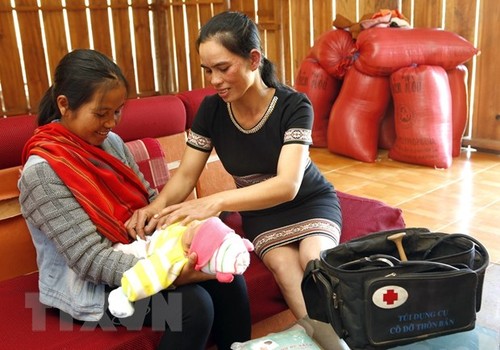 Training for “hamlet's midwife" at Tu Mơ Rông district, Kon Tum province (Illustrative photo: Duong Ngoc/VNA) Training for “hamlet's midwife" at Tu Mơ Rông district, Kon Tum province (Illustrative photo: Duong Ngoc/VNA) |
The project “Leaving no one behind: Innovative interventions to reduce maternal mortality in ethnic minority regions in Vietnam” will be implemented in three years.
UNFPA Representative in Vietnam Kitahara Naomi said: "The signing to launch the project demonstrates UNFPA's continuing commitment to support the government of Vietnam to ensure the rights for all and to ensure the provision of quality sexual and reproductive health services to prevent maternal death. That's contributing to Vietnam's effort to achieve SDGs by 2030."
The UNFPA will work with the Vietnamese Health Ministry and Health Departments of six provinces of Bac Can, Lai Chau, Son La, Dac Nong, Kon Tum, and Gia Lai and social organizations to carry out the project.
Nguyen Duc Vinh, Director of the Maternal and Child Health Department under the Health Ministry, confirmed the support of the ministry to the project.
"Improving the health status of people, who were left behind, including ethnic minorities, is the center of the government’s development agenda. The best experience and practices learned from this initiative will help the Health Ministry implement the National action plan for the health of mothers, children, and newborn babies from 2021-2025 and toward 2030 and obtain sustainable healthcare goals,” said Vinh.
The project aims at increasing access and utilization of quality and voluntary sexual and reproductive health services among ethnic minorities, improving the capacity for emergency obstetric care in remote mountainous localities, and building a village-based birth attendant network in remote ethnic minority localities.